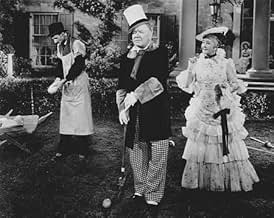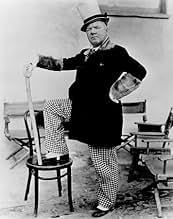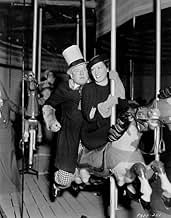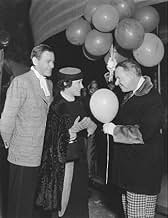Agrega una trama en tu idiomaCarny con artist and snake-oil salesman Eustace McGargle tries to stay one step ahead of the sheriff but is completely devoted to his beloved daughter Poppy.Carny con artist and snake-oil salesman Eustace McGargle tries to stay one step ahead of the sheriff but is completely devoted to his beloved daughter Poppy.Carny con artist and snake-oil salesman Eustace McGargle tries to stay one step ahead of the sheriff but is completely devoted to his beloved daughter Poppy.
- Dirección
- Guionistas
- Elenco
- Countess Maggi Tubbs DePuizzi
- (as Catharine Doucet)
- Carnival sword swallower
- (sin créditos)
- Boy
- (sin créditos)
- Bit part
- (sin créditos)
- Young woman
- (sin créditos)
- Gardener
- (sin créditos)
- Bartender
- (sin créditos)
- BIT part
- (sin créditos)
Opiniones destacadas
The 1925 "Sally of the Sawdust" had some good moments when Fields did his larcenous best - including a "heroic" scene at the end where he explains "Sally"'s true parentage at court, and saves her from prison. But Dempster's attempts at "gamin" like cuteness are tiresome to a viewing today. Lunt does well, but is a distinctly supporting actor here.
Fortunately sound came along, so that Mr. Lunt (now with Lynn Fontaine) would make THE GUARDSMAN and plenty of television appearances in the future to demonstrate their fine acting abilities. Ms Dempster, of course, just faded into oblivion. Fields too would benefit by sound, and would leave us that nasal twang that made us guffaw so much. And by doing "Poppy" as a sound film we were able to hear some of the dialog from the stage play that the silent film did not have. Mention has been made of three moments: the sale of the "talking dog", the business with the hot dog vendor (which is where the line at the start of this review comes from), and the business with the patent medicine purchaser ("No more"). A fourth one is the sequence (somewhat too brief) where "Professor" McGargle entertains the guests at a society party with some high sounding concerto on a strange looking stringed instrument. He ends up playing "Pop Goes the Weasel". At the end, when "Poppy" is revealed to really be the lost heiress, McGargle takes leave of his adopted daughter in a quiet, dignified way - not quite as tragic as a similar sequence in THE OLD FASHIONED WAY, perhaps, but equally not as tragic and total as his leaving her in the radio version of "Poppy" that was made within two years of the film. That version was put out on records about 1970, and keeps to the story, but seems sadder than this movie or the 1925 silent version.
This version of Poppy has Fields with daughter Rochelle Hudson as part of a traveling carnival that stops in one of the small towns where she falls for the son of the mayor Granville Bates. The son is played by Richard Cromwell. She falls hard too, but Fields see an opportunity for a really big con by passing her off as the daughter of one of the town's leading citizens who left and married a carnival man years ago and left a daughter unaccounted for.
There's a rival claimant in Catherine Doucet who was a cousin of the heiress and she's being stage managed by Lynne Overman as shrewdly as Fields is doing for his daughter. I can't say more, but some unexpected facts come to everyone's attention in the end.
The original story of Poppy was written by Dorothy Donnelly who collaborated with many folks, most prominently Sigmund Romberg as a lyric writer. The original show on Broadway had a full blown score with a bunch of composers all writing songs with lyrics by Donnelly and she wrote the book as well. None of which were used in this film.
Fields is a bit more serious in this part than he normally is, still there are enough Fields type situations to satisfy his fans. What was interesting is that he was being equally matched by Doucet and Overman in chicanery.
Poppy is a much dated old fashioned story, but with W.C. Fields even a somewhat muted Fields it still rates a look.
Once again, the inimitable W. C. Fields manages to merge the lovable & the larcenous into a highly amusing package designed to delight even the most jaded audience. Watching him perform his classic routines - the temperance lecture, the croquet game, the instrumental solo - is to be in the hands of a comic master. And has cinema produced funnier frauds than The Talking Dog or Purple Bart's Sarsaparilla? Probably not.
Fields had played the flimflamming professor before - on Broadway in 1923 and in D. W. Griffith's silent SALLY OF THE SAWDUST and he had made the role his own. But Fields' health was now at a low ebb after years of alcoholic overindulgence and he needed 10 months of rehabilitation and a sojourn in a sanitarium before beginning POPPY. And the filming itself was not without incident: his scene on the ordinary' bicycle - which could have been handled by a stunt man - resulted in a fall that broke a vertebrae, leaving him in much pain. This is not apparent in his performance, however. (Another accident after filming ended sent him back for a further stint in the hospital.)
Fields' co-stars also do much to add to the high entertainment level of the film: Catherine Doucet & Lynne Overman play a conniving countess & shyster lawyer who have their own plans for getting their greedy hands on the envied greenbacks; Maude Eburne is a fiercely protective old lady who befriends Poppy; and skeletal Bill Wolfe is very droll as a gardener who refuses to be cheated by one of Fields' scams. Movie mavens will recognize Dewey Robinson as the calliope driver who is one of Fields' early victims.
As the young lovers, you could scarcely have done any better than Rochelle Hudson & Richard Cromwell. Having both lit-up many a film during the 1930's, they bring a great deal of charm to their roles, even in scenes which spread on the sticky sentiment a bit too thick. And Miss Hudson supplies the film with its loveliest moment when she sings A Rendezvous With A Dream,' a tune which definitely deserves to be revived.
Fields, of course, dominates everything. Which is as it should be. However it is sad that the contributing factor to his eventual death - dipsomania - was already starting to destroy his body when he made this very funny film.
¿Sabías que…?
- TriviaWhile filming the movie, W.C. Fields regularly drank from a flask, which he insisted was only "pineapple juice." One day, however, the stagehands replaced the vodka in the flask with real pineapple juice. When Fields tasted it, he sputtered and shouted, "Who put pineapple juice in my pineapple juice?!"
- Citas
Hot dog vendor: [as McGargle and Poppy begin to eat their hot dogs] Twenty cents, please!
Professor Eustace McGargle: Very reasonable! I'll pay you at the conclusion of our engagement.
Hot dog vendor: Oh, no, you won't! You're gonna pay me right now!
Professor Eustace McGargle: [the vendor takes back Poppy's half-eaten hot dog] Really! I shall return mine also.
Hot dog vendor: [looking at McGargle's half-eaten hot dog] Listen, you tramp, how am I gonna sell these again?
Professor Eustace McGargle: First you insult me. Then you ask my advice concerning salesmanship. You, sir, are a dunce! DUNCE, sir! D-U-N-C... How do you spell it?
[Walking away with Poppy]
Professor Eustace McGargle: Come, dear, let's go.
- Créditos curiososThe film opens with a shot of a flower blooming, with the title "Poppy" emerging from the flower as it blooms. The flower motif continues through the rest of the opening credits.
- ConexionesFeatured in W.C. Fields: Straight Up (1986)
- Bandas sonorasPoppy
(1936) (uncredited)
Music by Friedrich Hollaender (as Frederck Hollander)
Lyrics by Sam Coslow
Played during the opening credits and Sung by an unidentified chorus
Selecciones populares
Detalles
- Tiempo de ejecución1 hora 13 minutos
- Color
- Relación de aspecto
- 1.37 : 1
Contribuir a esta página

































